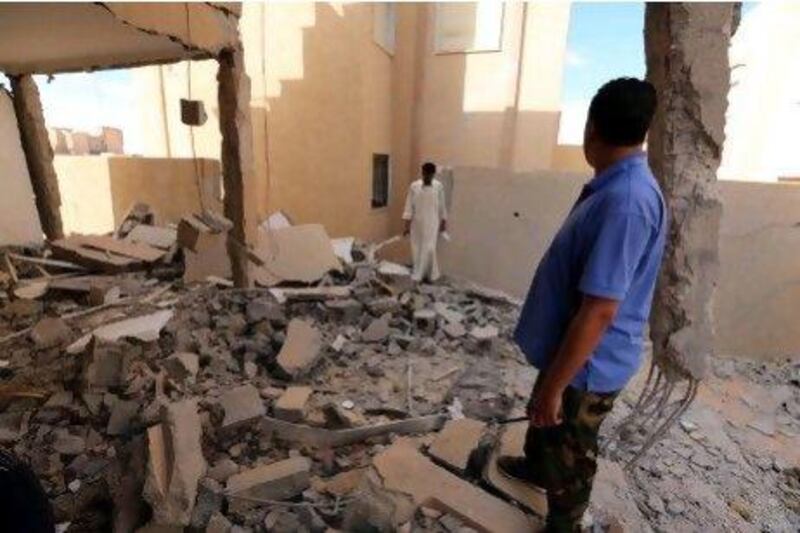TRIPOLI // Ahmed Bisher grins broadly as he recalls the day Muammar Qaddafi died.
On that day, a year ago tomorrow, the young man drove joyously with his friends for hours to reach the capital and join the masses in the streets blaring their horns, waving flags and dancing.
"I can't describe how I felt," the government security worker, 24, says of that night. "It was an extraordinary feeling and I never felt like this before."
Sitting in Martyrs' Square in central Tripoli, where Qaddafi used to harangue crowds from the ruins of a Crusader fortress, Mr Bisher says he still finds it strange that he is be able to say such things.
"We have freedom," he says. "Before, we were shackled."
But reflecting on the year since the autocrat of 42 years was dragged from a drain in his hometown of Sirte and beaten to death by a mob, he warns there are people trying to "sabotage the revolution".
Mr Bisher's concerns reflect those of politicians, ordinary Libyans and international officials.
They worry the country, still bristling with weaponry, controlled by militias and bitterly divided, has yet to become the peaceful democracy its revolutionaries called for when they rose up in an internationally backed rebellion 18 months ago.
After a euphoric election day in July, in which 200 members of an interim governing body were elected, the General National Congress has yet to take power as members have been unable to agree on a prime minister and cabinet.
Gunmen of rival militias from historically divided tribes and areas clash periodically, unchecked by weak security forces.
And perhaps more worrying, extremist armed groups appear to operate with impunity, and were probably responsible for killing four Americans in a September 11 attack in Benghazi that horrified the world and prompted furious demonstrations against militias by Libyans.
"It was very difficult when we overthrew Qaddafi," says Ahmed Langhi, a new government member who once trained in the deserts of Algeria to fight guerrilla-style against the old regime.
Mr Langhi now wears a suit and sips macchiatos in the luxurious Rixos hotel, the conference centre of which forms the seat of the Congress.
"We are the first school year of democracy and we are going to make some mistakes," he says.
"The security situation is the most difficult thing. The guns are everywhere and the armed militias do have the real power in Libya."
The 10-month-old transitional government has tried and failed to integrate the tens - if not hundreds - of thousands of armed young men into security forces and control the small number of groups that refuse to operate under government auspices, says Mr Langhi.
An interior ministry initiative, the supreme security council, whose leader told local media he employs 131,000 people nationwide, was the "biggest security mistake" he says.
Its leadership jostles with the minister and it has failed to implement security.
"To stabilise the country in 10 months is sometimes an overestimation of what humans can do," says the leader of that NTC transitional government, the prime minister, Abdurrahim Al Keib, on the sidelines of a constitutional conference on Wednesday.
While levels of violence may not be what "statistically minded" westerners expect, he points out that basic services and education systems are functioning well.
Those caught in the continuing violence are less sanguine.
"Libya is so absurd now, it's not OK. We killed Qaddafi but the regime is the same," said Marryam Al Tayyib, one of the few women who fought on the front lines with the rebels, from Bani Walid, a town where many supported Qaddafi.
Since last month, Dr Al Tayyib says, the town has been surrounded by government fighters from the coastal city of Misurata.
They refuse to allow people in or out and stop food, medicine and fuel coming in after the shooting, arrest and eventual death last month of a Misuratan man, Omran Shaaban, who was one of the mob that killed Qaddafi.
Medical officials said yesterday that clashes between pro-government militias and fighters loyal to Qaddafi killed at least six people and wounded about 80 on Wednesday.
A Misuratan journalist, Abdallah Al Kabir, describes the situation in Misurata as "very tense" and says people there, "are aware of what's happening and are ready for any action against the counter-revolution … there is a huge force in Misurata waiting for orders".
Dr Al Tayyib, who filled the air with screams of joy and machinegun fire when Qaddafi died, says there are people in Bani Walid - her own mother among them - who had supported the old leader
"So what?" she says angrily.
"You want to kill them? That's their opinion."
But despite the continuing security problems and shaky government, many people remain optimistic and still relish their hard-won freedom.
Outside the shattered ruins of the Bab Al Aziziya compound in Tripoli, one of Qaddafi's many homes, a group of artists paint murals on the graffiti-splattered walls of a military compound.
One of them, Fatha Rafai, explains that a new Libyan NGO has called for people to paint a panel expressing what they want from the government.
He is putting the finishing touches to a bright-green Libya awash in the blood of the martyrs, with the outstretched arms of two figures reaching for a crescent - for the revolution they have achieved - and a pair of scales for the justice they do not yet have.
Gesturing at the bombed-out compound, painting on the walls of a street he was once forbidden to enter, Mr Rafai says: "I'm very happy to express myself here. I'm glad he's gone."





